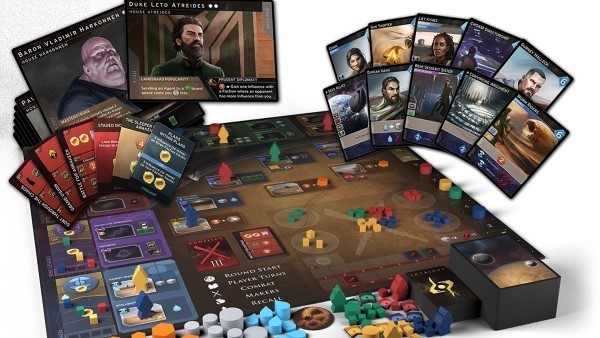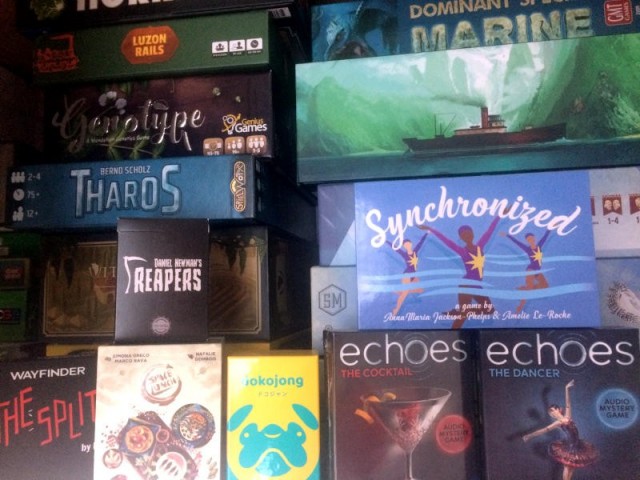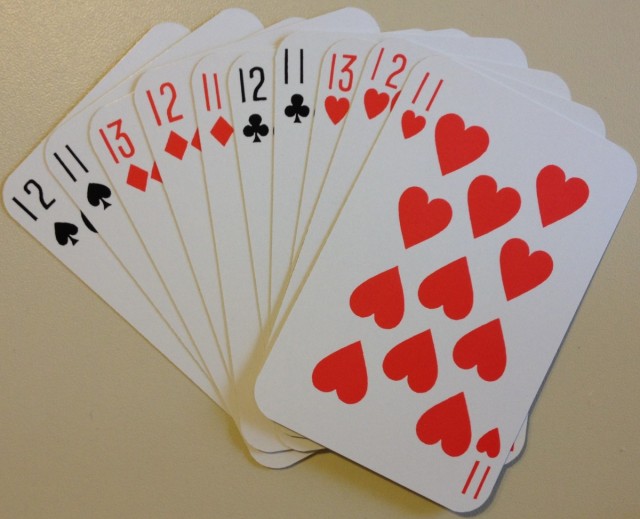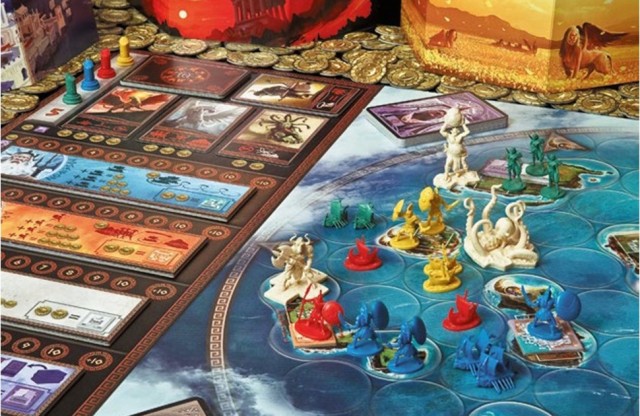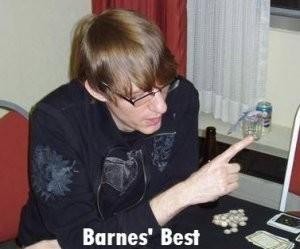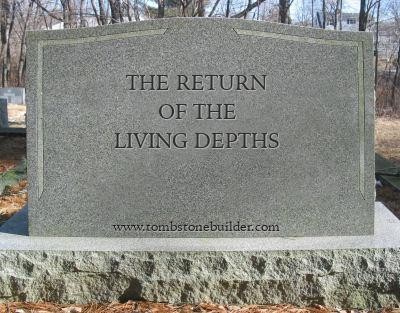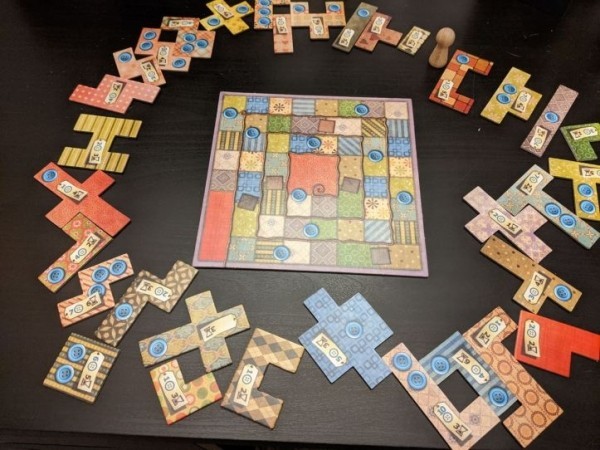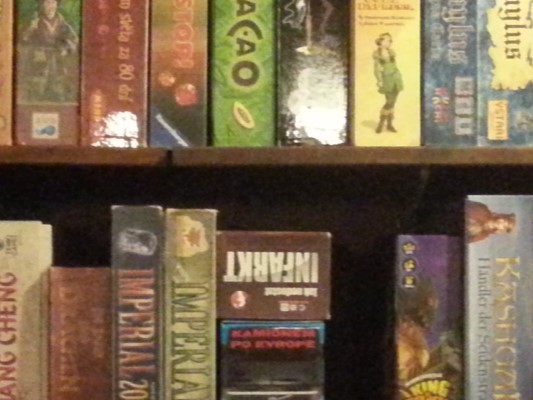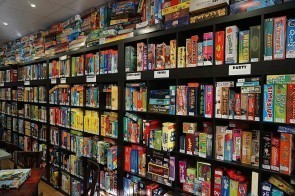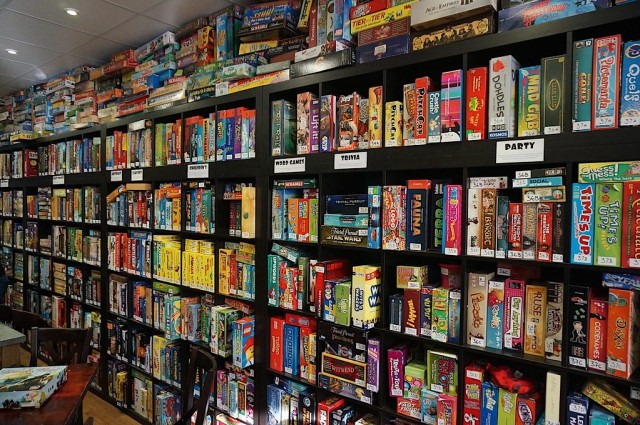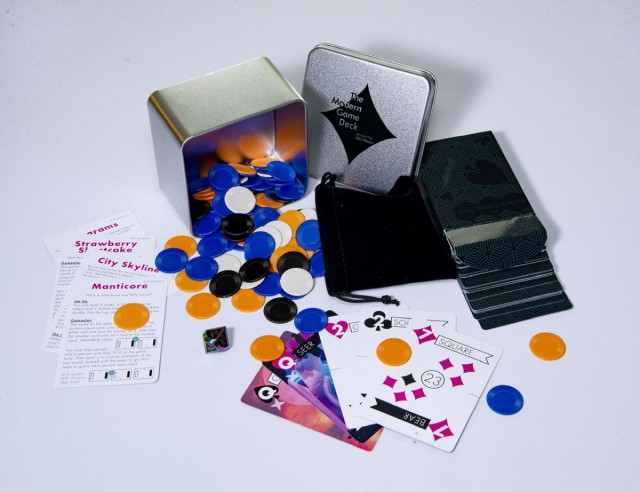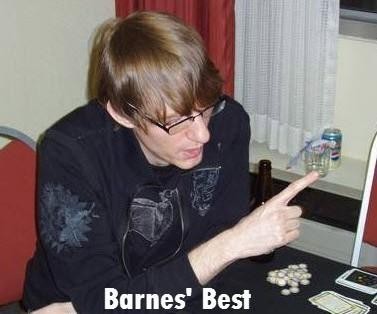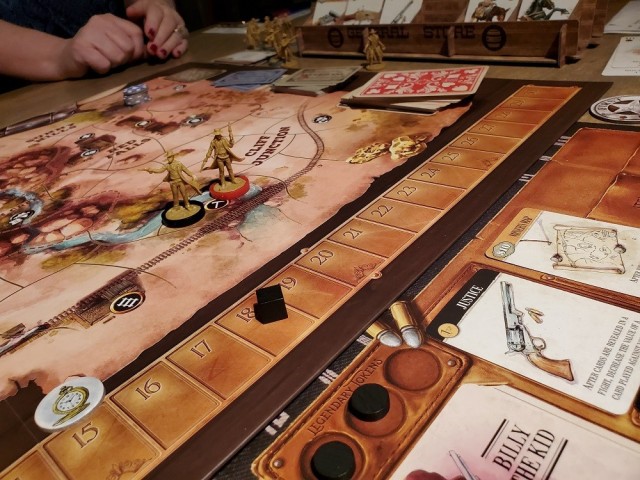Though I have as of late heaped tons of scorn upon the collectible model of gaming, it wasn't always that way. In fact, I can directly thank Collectible Card Games (CCGs) for keeping me tethered to the gaming world long enough for me to discover boardgaming again.
So, in tribute of this fact, I thought I would list my top 10 favorite CCGs...ever. I wondered about the relevance to "Ameritrash", but then realized that CCGs are essentially Baseball Cards combined with Dungeons and Dragons....I just don't think it gets more Ameritrashy than that.
10.) RAGE
Well, I can already sense your disappointment in the way this list has started, so let me come to the defense of this practically forgotten CCG. The premise was simple; you have a pack of werewolves, and you either want to outscore your opponent or eradicate his tribe. Points were scored by moots ("votes", or political actions) or by straight out combat with either "Enemies" in a central area of the board or by fighting your opponent's werewolves.
The fun of the game lie in combat, combat, combat. Long story short, you could really heap some abuse on your foes, using cards with charming titles such as "Entrail Rend", "Spine Crushed", and the ever-popular "Mangle". When you had multiple people involved, the fun multiplied as the number of foes to brutalize increased. And the more players there were, the more "political" you needed to be...the winner was often the one who flew just under the radar long enough before going on a killing spree.
Why it isn't #9:... Unless you're a BIG fan of combat, you may very well not enjoy this game. Only about 20% of the cards in this game are useful (assuming you have access to all of them...some of the rares are so broken, you'll be screaming "WTF?"...The "politcal" actions were often very weak and difficult to pass, making fighting the usual path to victory. The lack of depth hurts this one quite a bit, but it really is a blast to play.
9.) LORD OF THE RINGS (DECIPHER)
Hey, I admit it. I'm a HUGE Tolkien fan. I played the fun-but-oh-so-convoluted ICE Middle Earth game (and still have the headaches to prove it). So I jumped at the chance to play a game based on the new movies coming out.
The game is based on the premise of moving the ringbearer (Frodo, though sometimes Sam lends a hand) from the first site of the game all the way to the last. Along the way, your opponent will try to impede your progress, using ferocious beasts like the Witch King and the Cave Troll to try and stop you cold (or, better yet, eradicate your Ringbearer). There's going to be a LOT of fighting along the way, but I believe Sam said it best: "There are some things worth fighting for."
As par for the course, the cards are gorgeous, using nicely captured images from the films. And much like another certain Decipher CCG, you're going to get a chance to use even the most minor of characters to help you in your quest ("Albert Dreary", a card from the first set, is based on the brief cameo by director Peter Jackson that literally lasts 3 seconds).
Why it isn't #8: As fun as skirmishing is, it sometimes feels like that's really all there is to it--move, skirmish, move, repeat. The game also suffers from a lack of different paths to victory...either get the ringbearer to the end, or kill (or corrupt) your opponent's ringbearer. This leads to some fairly limited gameplay. Also, there are some balance issues, with about 30% of cards actually being useful...suffering from the "rare cards are better" syndrome that plagues lots of games (some early cards are so good Decipher has had to ban them, a practice they once promised they'd never employ). Still, this is a solid game with a huge following--and rightfully so.
8.) WWE RAW DEAL
Raw Deal simulates the battle of WWF...er...WWE superstars as they try to outwrestle and outsmart your opponent. You play maneuvers and actions in hopes of depleting your opponent's "arsenal" (read: deck) and scoring the victory. However, you aren't helpless during an opponent's assault--"reversal" cards can help you prevent your opponent from crushing your skull with a bonecrunching piledriver or body slam.
So how did this game, based on the silly antics of professional wrestling, end up on a list of "Best" CCGs? It's mainly because of the diversity of strategy present. Each wrestler has a certain special ability that you can abuse to help achieve your goals. Some wrestlers, like Chris Jericho, specialize in stripping your opponent's hand of cards. Others, like Kane, focus on dealing direct damage to your opponent. Essentially, if it's a strategy you've seen in other card games, it's one you can pursue here. Use Flair to control your opponent's resources...or the Undertaker to slowly turn your discard pile into a growing resource of its own.
Aggro, control, discard, lockdown...*all* of these strategies can be pursued in Raw Deal. And since some of your actions and maneuvers will be more important than others, you'll find yourself trying to bait your opponent to reverse the wrong thing at the wrong time. Raw Deal has been dubbed "Chess with Chair Shots"--a description I can wholeheartedly endorse--and even if you AREN'T a pro-wrestling fan and don't know your Triple H from your Kurt Angle, there's probably something here for you to like.
Why it isn't #7: Well, I'd be fooling myself if I didn't understand that hey, the license just isn't for everyone. Unforunately that can detract from the game itself (which would ironically work with multiple licenses and concepts--change "maneuvers" to "military attacks" and you can see where I'm going). Also, the Ultra-Rare chase cards can be tough to come by, and are necessary for a number of decks to work properly. Not all the useful cards are rares--but you're definitely going to need multiples of some of the "staples", which can put you at a disadvantage over someone who does have them.
7.) MYTHOS
Okay, I also have to admit I'm a huge Lovecraft fan, so naturally I had to give this little niche CCG a try. In Mythos, you play the role of an "Investigator" trying to get to the bottom of some very mysterious happenings in jolly old New England. Of course, the things you find out just might drive you mad!
You try and complete "stories" by travelling around using location cards and play each of the pre-requisites of the story. For example, one story may require you to have a certain mix of allies and artifacts in play as well as travel to a certain location. Most of the time these stories mirrored existing Lovecraft tales, a very nice touch. In order to slow your opponent, you could play monsters that if not defended against would drain their sanity. You immediately lost the game if your Investigator "went insane" and lost all sanity points. A dark (and darkly humorous) game that will really sit well with fans of either Lovecraft or horror tales in general.
Why it isn't #6: Unfortunately, the game's mechanics rewarded a player a bit TOO much for driving an opponent insane. This lead to games of pure "monster rush" strategies, which really detracted from the point of the game (telling stories, more or less). In tournament play, in fact, games were four players to help curb this type of strategy. Still, it really takes some of the fun away when you try and play a deck about "The Shadow Out of Time" and your opponent is simply intent on attacking you instead of accomplishing anything on his own.
6.) DOOMTOWN
Something's weird in the wild west, partner. In Doomtown, you play as one of many factions who have some sort of agenda (or something at stake) in the wild west. The game is all about playing locations and getting influence and victory points in order to establish dominance.Oh, and you play poker to settle gunfights. Yep, that's the really neat twist on Doomtown...when your dudes square off in a gunfight, you draw "poker hands". Each card in your deck serves a dual purpose; it also has a suit and card value associated with it. And since you could "stack your deck", well, it ain't uncommon to see four kings...of clubs.
Doomtown is a great game in which you "build the board" as you go, and your gunfighters move from site to site trying to either control locations or smoke out your opponent. It's your choice, partner.
Why it isn't #5: Speaking of cheatin'....it was a little TOO easy to cheat. This lead to some fairly degenerate strategies early on, particularly "flush" decks. And the cards to penalize your opponent were often not severe enough! Add to that fact that in the early going some of the factions were hideously unbalanced (Sweetrock, anyone?) and alot of gamers were turned off by the game in the early going. Some of these issues were addressed eventually, but most of the time "house rules" were the only things preventing some rather unfun gaming sessions. Too bad--Doomtown's combat is likely the most innovative we will ever see.
5.) LEGEND OF THE FIVE RINGS
A brilliant game of tactics, intrigue, and honor, L5R stands tall in the crowded field of CCGs. Different clans war with one another to either crush the others, achieve enough honor to be elevated above their foes, or to find true enlightenment. Of course, much blood and political intrigue will stand in the way of victory, and many issues will have to be settled on the battlefield of war.
Each player has "provinces" which represent the resources available to that player. Each turn new resources are revealed and gold can be spent on hiring personalities, followers, and items for battle. You can hamper your opponent's efforts by sending your troops to attack your opponent's provinces. If you ever reduce your opponent's provinces to zero, you have achieved a Military Victory. But not so fast--some personalities won't work for you if you don't have high enough "honor". In fact, achieve high enough honor through a variety of means, and you will achieve an "Honor Victory". And "Enlightenment Victory"...well, it's a tough one to pull off, but it is there if you want to try it. A flexible, open game that is rife with strategy, you'll definitely want to give it a try.
Why it isn't #4: There is one facet of the game you need to be aware of: The "Big Battle" syndrome. You see, whenever your armies square off, you compare power vs. power. If you lose, even by *one* point...the entire losing army is destroyed. ALL of them. Couple that with the unpredictability of combat (certain cards can remove personalities from battle or kill them outright) and one simple mistake can cost you the game. Also, it is worth mentioning that in a two-player contest, it is nigh impossible to come from behind and snatch victory away from your opponent. Usually, the loser of the "big battle" is done for good, no matter how many provinces are left under his control.
4.) JYHAD/VAMPIRE
Jyhad is a game depicting the struggle of Vampire clans battling for supremacy. Each player undertakes the role of ancient vampires pulling the strings of underlings to accomplish your dastardly deeds. Working from a starting pool of 30 "blood", you spend this to bring locations, vampires, and items under your control. You then use them to attack or undermine your opponent's efforts to win the game. But watch out--the more you spend, the less you have--and run out of blood, and the game's over.
Jyhad succeeds on so many levels because of its depth. Some vampires have "titles" which grant them rights to call Votes (usually represented by cards). Some of these votes (unlike Rage) can have drastic impact on the game, and buidling a viable political deck is fairly easy to do. Likewise, some clans prefer brutal fights, and their gifts support such endeavors. The combat system itself is fairly deep, having its own phases, and covers hand-to-hand, the use of weapons, the elements, and even the range that combat takes place. Get two combat decks together and you're going to virtually be playing a miniature game of chess during combat, which is often visceral and thrilling. Lastly, some clans prefer to eschew combat and utilize stealth to destroy an opponent's resources. They can do alot of damage this way, but most decks oriented this way are in some DEEP trouble if the combat fiends ever get their hands on them.
With multiple players, there will often be layers of things going on, and if you don't pay attention (and occasionally wheel and deal) then you aren't going to last long. A very "elegant" CCG, indeed (with apologies to Mr. Barnes).
Why it isn't #3: Well....let's just say that a multiplayer game of Jyhad can take a while. A LONG while. I once participated in an eight player game that lasted four-and-a-half hours. Now, I enjoyed every minute...but the game length can DEFINITELY be a huge stumbling block for some players, and I can understand that.
Honestly, though, if the game were sped up or some of the elements removed, it wouldn't be the same game at all. Also, in two-player most of your outcomes are easily predictable, so these contests are generally not much fun at all. Oh, and since the game received a rename after it's first set, you'll have to use sleeves if you want to mix the cards. Despite these flaws, it truly is a great game--but you've been warned on the time thing.
3.) NETRUNNER
Okay, stop me if you've heard this one. Future setting--mega-corporations are corrupt--and "hackers" are the new "anti-heroes" who use their "l33t skillz" to strike back at these corporations and essentially make a living. Sounds like just about every Cyberpunk story since...well...Cyberpunk, doesn't it?
In Netrunner, you take on the role of either the dastardly corporation or the plucky "Netrunner". The corporation wants to protect its resources and advance its agendas at all cost; the runner wants to expose and destroy these resources and agendas and score a little coin for himself. That's all well and good, but the beauty of this game is in the gameplay. The corporation can create "Data Forts", which are merely face down cards that usually represent some agenda (though they can be traps, too). Then, they can fortify these areas with "ice", nasty programs who will have to be dealt with before the runner can access what's inside.
Fortunately the runner has the aid of programs who can help him defeat or shut down these counter-measures. A cool concept here is that the corporations hand, deck, and even discard pile are legitimate targets for the runner to attack, and have to be defended as well. A very high concept game that is a real blast to play, especially if you're into the setting. As a bonus, this is one of the very few CCGs that actually plays better out of a starter than with preconstructed decks. One factor cited in less-than-stellar sales of the game was the fact that you could purchase two double-starters and be perfectly happy with that gameplay experience for quite awhile...hardly the CCG method of sales, for sure.
Why it isn't # 2: Remember the whole "rares are better" mentality that plagues LOTR and other CCGs? Well, it's in full effect here. A person with more rares is obviously much better off, and I simply don't agree about that being a good thing for CCG design. Also, there are some balance issues between the runner and the corporation that become evident after much playing and tweaking. Still, you could do worse off than give this CCG a "run".
2.) STAR WARS (DECIPHER)
Star Wars lets you take the roles of Han, Luke, Leia and even Vader, Boba Fett, e.t.c. to take control of the galaxy. You "build the board" as you go along, and try and control strategic locations that will help you damage your opponent. Add that to a nifty resource mechanism (your cards are your life are your resources) and a miles-deep combat system, and you can easily see why this is (almost) the King of CCGs.
When Star Wars debuted, it was to great skepticism as well as great excitement. The property as a whole was seeing a huge upswing after being dormant for several years, with new novels, toy lines, and other merchandise being introduced. Thankfully, the game was released during the era of CCGs where CCG designers were not afraid to make "gamer's games", and even though the learning curve was steep gamers quickly found there was plenty of strategic depth in Decipher's Star Wars CCG. Basically, if you could do it in the movies, you could do it here. The game ran all the way through Episode I, before it died an unjust depth so that WotC could publish Garfield's rancid dice-based version. My advice? Battle through the intense learning curve. It's worth it.
Why it isn't #1: Oooh, boy. You ever tried teaching this to someone inside an hour or two? Three? A day? To say Star Wars has some *serious* rules complexity going on would be like saying that Matrix Revolutions was *slightly* disappointing. Layers upon layers of rules await the unitiated, and the learning curve is steep. Some of the rules ultimately add nothing to the game (Bluff Rules? Asteroid Rules?) and some will cause you such rules headaches that even pros still wrestle with them. Star Wars, however, remains that "enlightened" state of gaming...once you "get it", it's in you forever. Like in the Matrix, where they stare at the code and see "Blonde, Brunette, Redhead" you'll soon reach the state where you look at the table and see "Force Drain, Destiny Draw, Crushing Battle." One of the best of all time, if not for......
1.) MAGIC THE GATHERING:
Look, I'd be lying to you if I said I didn't try to displace this one from the top spot. In actuality, the fact of the matter is this: Magic is the grandaddy of CCGs, and if you doubt its quality and staying power, simply note that IT'S STILL HERE while many others on this list are already gone.
I'll break it down for the one or two folks who never played or at least witnessed a game: you try and use your lands (resources) to cast creatures and spells to knock your opponent's life to zero. How many ways can you do that? Well.....that's the real beauty of Magic, and why it's still alive and kicking. Every time you sit down to build a Magic deck, it's like an open canvass. How do you want to defeat your opponent? What do you want to do? If many of these other CCGs are capable of accomodating so many strategies, it's only because Magic invented them in the first place. Aggro? Control? Counter? Direct Damage? All here. The flexibility of the game is staggering, and literally every deck you build can feel and play differently.
I may not actively play Magic anymore, but even *I* know a masterpiece when I see one. Is Magic perfect? Well, let's not go that far. The "Type II" format has been both condemned and praised (sometimes in the same breath). Magic's a "money game" no doubt about it. Because whole sets of cards rotate out of the competitive environment, you're going to be chasing a lot of cards and spending a ton of cash.
However, if you just want to play with friends--well, you're all set. Everything's legal! Also, of all of the CCGs listed, Magic is one of the few where decks full of Commons can still be viable. I'll never forget competing in a big tournament in Memphis with a deck of 20 multi-lands, 4 Juzam Djinns, a Black Lotus, and more "power cards" that put the value of the deck over $1,000 (this was in 1995...I shudder to think it's value now). I was put out n the quarter-finals by a kid running Kird Apes, Scryb Sprites, and Giant Growth. Total value of the deck: probably less than $20. Yikes. "Humbling" doesn't cover it.
Well there you have it! Thanks for reading, and feel free to share YOUR favorite CCGs.
 Games
Games How to resolve AdBlock issue?
How to resolve AdBlock issue? 